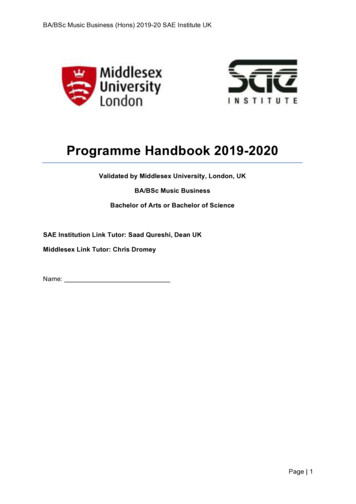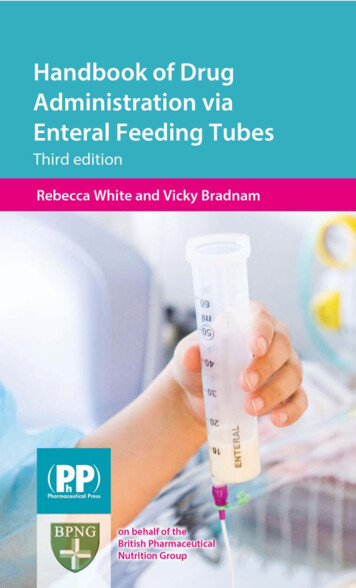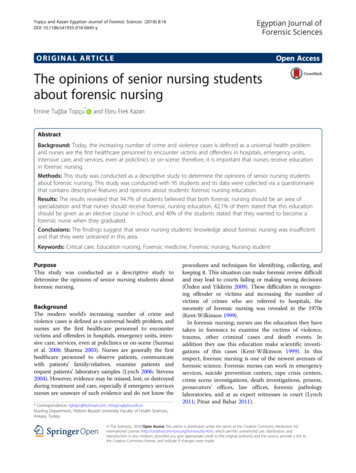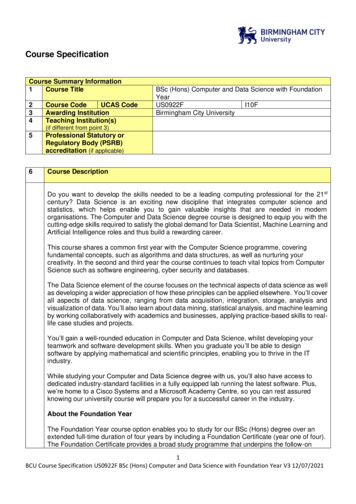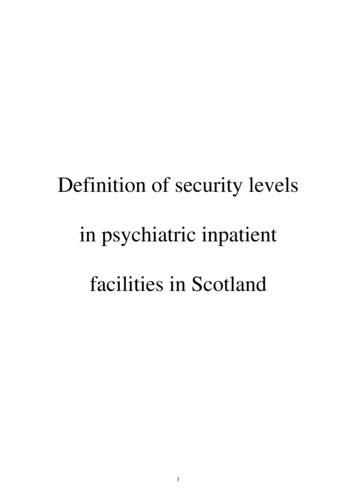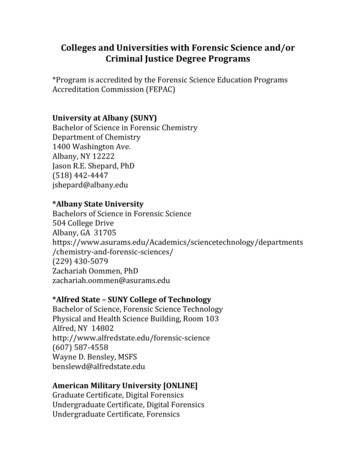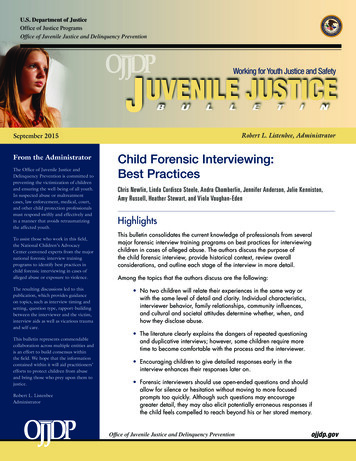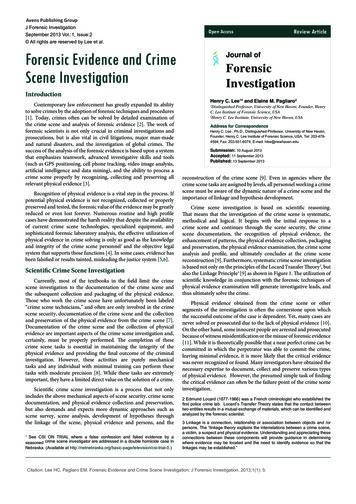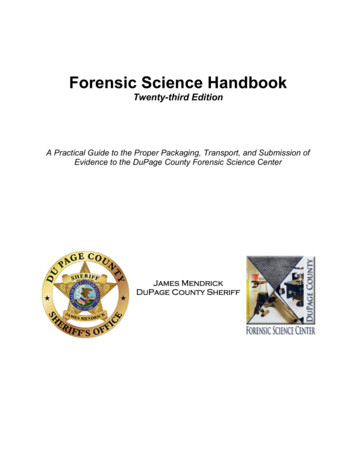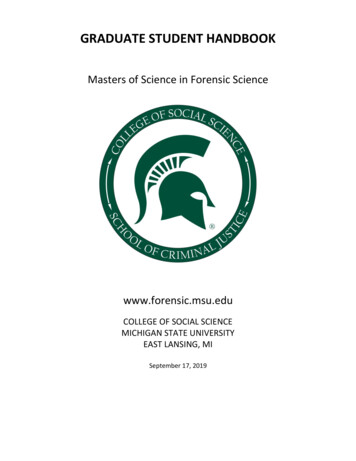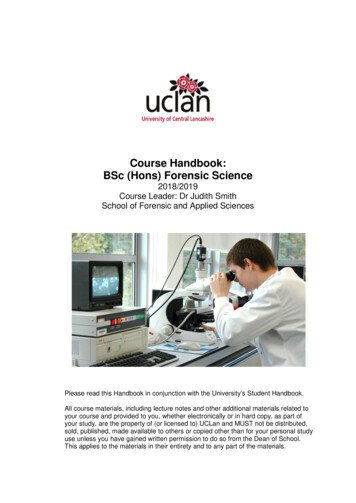
Transcription
Course Handbook:BSc (Hons) Forensic Science2018/2019Course Leader: Dr Judith SmithSchool of Forensic and Applied SciencesPlease read this Handbook in conjunction with the University’s Student Handbook.All course materials, including lecture notes and other additional materials related toyour course and provided to you, whether electronically or in hard copy, as part ofyour study, are the property of (or licensed to) UCLan and MUST not be distributed,sold, published, made available to others or copied other than for your personal studyuse unless you have gained written permission to do so from the Dean of School.This applies to the materials in their entirety and to any part of the materials.
Table of Contents1. Welcome to the course . 41.1 Rationale, aims and learning outcomes of the course . 41.1.1 What are the Aims of the Course? . 41.1.2 What are the Learning Outcomes of the Course?. 41.2 Course Team . 51.3 Expertise of staff . 81.4 Academic Advisor . 81.5 Administration details . 81.6 Communication . 91.7 External Examiners . 92. Structure of the course . 92.1 Overall structure . 92.2 Modules available . 102.3 Course requirements . 122.4 Progression information . 122.5 Study time . 132.5.1 Weekly timetable . 132.5.1 Expected hours of study . 132.5.1 Attendance requirements . 143. Approaches to teaching and learning . 143.1 Expertise of staff . 143.2 Learning and teaching methods. 143.3 Study skills . 163.4 Learning resources . 163.4.1 Learning Information Services (LIS) . 163.4.1 Electronic resources. 173.5 Personal development planning. 173.6 Preparing for your career . 184. Student Support . 194.1 Academic Advisors . 194.2 Students with disabilities. 204.3 Students’ Union One Stop Shop . 20
5. Assessment . 205.1 Assessment Strategy . 205.1.1 Presentation of Written Work . 225.1.2 When will the Assessments take place?. 225.1.3 Assessment arrangements for students with a disability. 225.1.4 Submission of Assessments . 225.1.5 Deadlines for Assessments . 225.1.6 Extensions . 235.1.7 Extenuating Circumstances. 235.1.8 Feedback . 245.1.9 Reassessment . 245.2 Notification of assignments and examination arrangements . 245.3 Referencing . 245.4 Confidential material . 255.5 Cheating, plagiarism, collusion or re-presentation . 256. Classification of Awards . 266.1 Exit Awards . 276.2 Appeals . 277. Student Feedback . 287.1 Course Representatives and School President . 287.2 Student Staff Liaison Committee Meetings (SSLCs) . 298. Appendices . 298.1 Programme Specification . 29
1.Welcome to the courseWelcome to the School of Forensic and Applied Sciences. Forensic Science at UCLan isoutstanding amongst other UK programmes by merit of its breadth and depth, the expertiseof staff, and its facilities. The course covers forensic investigation, forensic biology, forensicchemistry and forensic anthropology. In addition to fitting the student for a wide range offorensic careers, the course has a strong emphasis on transferable, employable skills, and itis expected that graduates will be well prepared for careers in a number of areas. TheSchool is vibrant, friendly, diverse and busy, and houses a wealth of staff experience. Wewere the first UK department to have a dedicated crime scene simulation house and nowhave three properties representing different scenarios. We have state-of-the-art laboratoryfacilities and an impressive skeletal collection, comprised from both teaching specimens andarchaeological material; and our final year students always organise one of the bestgraduation balls in the university!1.1 Rationale, aims and learning outcomes of the courseAll courses at the University have overall aims and learning outcomes,which describe what you will achieve on your course of study. You coursehas been designed by academics and forensic practitioners and has beenaccredited by the Chartered Society of Forensic Scientists to ensure thematerial covered prepares you with the appropriate knowledge and skillsfor the future.1.1.1 What are the Aims of the Course?It is important that you and the teaching team are clear about exactly what we are aiming toachieve. The aims of the course are: to develop the skills necessary to take part in a forensic investigationto provide experience of examining forensic evidence and case workto develop students’ skills in communicating both verbally and in writing, in selforganisation and motivation, and in acquiring and maintaining a professional approach totheir workto encourage development of a critical and analytical and skills of personal reflectionto provide students with detailed contextual knowledge of subjects underpinning forensicscience in the broad areas of biology, chemistry, law and methods of forensic investigationto develop practical skills in the underpinning forensic sciences (biology, chemistry andsearch and recovery)to provide students with the skills necessary to allow them to carry out an independentresearch project1.1.2 What are the Learning Outcomes of the Course?This list of the major learning outcomes of the course will give you an idea of the global learninggoals. However, in the module booklets you will see the syllabuses of the individual modulesand their learning outcomes that will give your more information. You could also refer to themodule descriptions which are in effect summaries of the module booklets and are availablethrough our website or on BlackBoard.
At the end of the course you will have a knowledge and understanding of: Basic principles of forensic scienceUnderpinning science applicable to forensic scienceMethods of forensic investigation and law relevant to forensic scienceContextual knowledge and understanding in areas of forensic chemistry and forensicbiologyAt the end of the course you will have obtained the following cognitive skills and willbe able to: Select and interpret information from a range of sourcesFormulate and test appropriate scientific concepts and hypothesesPresent results and structured argumentsPlan and carry out independent learningAt the end of your course you will be able to: Describe and critically evaluate methods used in crime scene scienceIndependently carry out practical techniques important in forensic scienceWork safely in the laboratory and at crime scenesCritically interpret data, write reports and apply the basics of rules of evidenceApply specialist knowledge of forensic practices to investigations and casesDuring the course you will also develop transferable skills and be able to: Communicate effectively in written and verbal contextsWork independently and in co-operation with othersPerform calculations and appropriate statistical analysisUse ICT effectivelyRetrieve information from a range of sources, such as books, scientific reports, journals,case studies, CD-ROMs and the internetMost students studying Forensic Science will go on to study and achieve a Bachelor ofScience degree with Honours; however, you may also exit your degree scheme with aBachelor of Science degree without honours, a Diploma of Higher Education (DipHE) or aCertificate of Higher Education (CertHE)1.2 Course TeamYou will be taught by staff from the University and Forensic Science Practitioners. This listrepresents those co-ordinating particular areas, or who have particular roles in the delivery ofthe Course. We have included their qualifications so that you can see where their expertiselies.
Steve AndrewsBSc, MScSenior Lecturer (Fire Investigation)email: spandrews@uclan.ac.uk Ext 4173 Room JBF002Paul CallaghanCrime Scene InvestigatorAssociate Lecturer (Crime Scene Investigation)Module Tutor FZ1034: Volume Crime Scene Sciencee-mail: pcallaghan1@uclan.ac.uk Ext 4029 Room JBF103Kartina ChoongMA, PhDReader (Medical Law and Ethics)Module Tutor LA2800: Law for Forensic Scientistsemail: kachoong@uclan.ac.uk Ext 3681 Room HB212Isobel ColcloughMScLecturer (Forensic Science)e-mail: ilcolclough@uclan.ac.uk Ext 4171 Room JBF106Carol CoxBSc (Hons), MSc, PGCEHead of SchoolPrincipal Lecturer (Policing)e-mail: ccox1@uclan.ac.uk Ext 3757 Room MB056Peter CrossBSc, MScLecturer (Forensic Anthropology)Module tutor FZ2051: Forensic Anthropologyemail: pacross1@uclan.ac.uk Ext 4153 Room MB134Rachel CunliffeBSc, MScAssociate Lecturer (Forensic Anthropology)Module tutor FZ1054: Introduction to Osteology and Anthropologye-mail: recunliffe@uclan.ac.uk Ext 3755 Room MB129William GoodwinBSc, PhD (Molecular Biology)Reader (Forensic Genetics)e-mail: whgoodwin@uclan.ac.uk Ext 4254 Room DB326Sibte HadiM.B.B.S; DMJ; PhDSenior Lecturer (Forensic Genetics and Medicine)Module tutor FZ3015: Forensic Medicinee-mail: shadi@uclan.ac.uk Ext 4395 Room MB131Phil HouldsworthMSc, FIBMSLecturer (Forensic Toxicology)e-mail: pehouldsworth@uclan.ac.uk Room to be confirmedArati IyengarBSc, MSc, PhD (Genetics)Senior Lecturer (Forensic Genetics)Module tutor FZ2011: Introduction to Forensic Genetics, FZ3501:Forensic Science Dissertatione-mail: aiyengar@uclan.ac.uk Ext 3925 Room MB130
Susan JonesBSc, MSc, PhD (Chemistry)Associate Lecturer (Chemistry)e-mail shjones@uclan.ac.uk Ext 4023 Room MB063Anna KirkhamBSc, PhD (Chemistry)Associate Lecturer (Chemistry)e-mail akirkham1@uclan.ac.uk Ext 3209 Room JBF105Janine McGuireBSc PhD (Chemistry)Lecturer (Forensic Chemistry)Retention TutorModule tutor FZ1063: Introduction to Chemistry, FZ1024:Chemistry for Forensic Scientists, FZ2023: Forensic Chemistry,FZ3023: Advances in Forensic Chemistrye-mail: jgmcguire@uclan.ac.uk Ext 4385 Room JBF109Kevin PritchardFSS Dip (Crime Scene Investigator)Senior Lecturer (Forensic Science)Course Leader: Forensic Science and Criminal Investigatione-mail: kpritchard@uclan.ac.uk Ext 4379 Room JBF001Allan ScottDMSLecturer (Forensic Science)e-mail: amscott1@uclan.ac.uk Ext 4394 Room JBF107Judith SmithBSc, PhD (Genetics)Senior Lecturer (Forensic Genetics)Course Leader: BSc (Hons) Forensic Science, BSc (Hons)Forensic Science and Anthropology, MSci Forensic Science andChemical Analysis, MSci Forensic Science and Molecular BiologyModule Tutor FZ1016: Introduction to Biology, FZ3011: ForensicGeneticse-mail: jasmith@uclan.ac.uk Ext 4257 Room MB057Anna StecBSc, PhD (Fire Chemistry)Reader (Fire Chemistry)Module tutor FZ3024: Forensic Toxicologye-mail: aastec@uclan.ac.uk Ext 3759 Room JBF108Will StockburnBSc, MSc (Chemistry)Associate Lecturer (Chemistry)e-mail wstockburn@uclan.ac.uk Ext 4381 Room JBF105Catherine TennickBSc, PhD (Forensic Science)Lecturer (Forensic Science)Module Tutor FZ2030: Criminalistics, FZ2036: Forensic Practicee-mail: cjtennick@uclan.ac.uk Ext 4170 Room MB128Adam WilcoxBScDemonstrator (Forensic Science)e-mail: awilcox2@uclan.ac.uk Ext 4396 Room JBF111
Claire WilliamsonBSc, MSc, PhD (Forensic Science)Lecturer (Forensic Science)Retention TutorModule tutor FZ1033: Skills for Forensic Scientistse-mail: clwilliamson@uclan.ac.uk Ext 4152 Room MB128Michael WysockiBA Hons, PhD (Archaeology)Academic Lead for Forensic Sciences,Lecturer (Forensic Anthropology and Archaeology)e-mail: mpwysocki@uclan.ac.uk Ext 4389 Room JBF0091.3 Expertise of staffThe School of Forensic and Applied Sciences is a vibrant, friendly and diverse environment.One of our many strengths is the staff within the school who are drawn from those who havehad careers as forensic practitioners, crime scene investigators or police officers and whosewealth of real life experience is used to ensure the subjects that we teach, and the skills youdevelop are fully applicable to a career in forensic science. Other staff are drawn from moreacademic backgrounds and bring with them a wide range of academic and research skills toinform their teaching. Staff are research active in areas of Forensic Taphonomy (the factorsthat influence the rate and pattern of decomposition), Forensic DNA analysis (humanpopulation genetics and the application of genetic analysis in wildlife crime), Evidence BasedPolicing and Chemistry ensuring you are exposed to the cutting edge areas of research inthis rapidly developing field of science.1.4 Academic AdvisorYou will be assigned an Academic Advisor who will provide additional academic supportduring the year. They will be the first point of call for many of the questions that you mighthave during the year. Your Academic Advisor will be able to help you with personaldevelopment, including developing skills in self-awareness, reflection and action planning.1.5 Administration detailsCampus Admin Services provides academic administration support for students andstaff and are located in the following hubs which open from 8.45am until 5.15pm Monday toThursday and until 4.00pm on Fridays. The hub can provide general assistance and adviceregarding specific processes such as extenuating circumstances, extensions and appeals.Foster BuildingForensic and Applied SciencesPharmacy and Biomedical SciencesPsychologyPhysical Sciencestelephone: 01772 891990 or 891991 (internal: 1990 or 1991)email: FosterHub@uclan.ac.uk
1.6 CommunicationThe University expects you to use your UCLan email address andcheck regularly for messages from staff. If you send us emailmessages from other addresses they risk being filtered out aspotential spam and discarded unread.We will normally communicate with you by email so you must check your university emailaccount daily. Staff should respond to emails within 48 hours (although please note that atcertain of year staff are extremely busy and it may take longer). Please communicate usingformal language and include appropriate details to help us deal with your enquiry (e.g. yourstudent number, course or module details). We may also send text messages (especially ifthere are timetable changes) so please make sure your contact details are correct or contactyou through the Blackboard virtual learning environment. Staff have an open door policy andyou may just drop in to see us (if we are available) and some staff will have appointmentsheets on their office doors. Contact details and normal working hours for each member ofstaff should be displayed by their offices.1.7 External ExaminersThe University has appointed two External Examiners to your course who help to ensure thatthe standards of your course are comparable to those provided at other higher educationinstitutions in the UK. The names of these people, their positions and home institutions canbe found below. If you wish to make contact with your External Examiners, you should do thisthrough your Course Leader and not directly. You can access the external examiners reportvia the Course site on Blackboard. The School will also send a sample of student courseworkto the external examiner(s) for external moderation purposes, once it has been marked andinternally moderated by the course tutors. The sample will include work awarded the highestand lowest marks and awarded marks in the middle range.The external examiners for BSc (Hons ) Forensic Science are:Kerry-Ann Milic, Kenyon International Emergency Services. Formally of Anglia RuskinUniversityDr Graham Williams, School of Applied Sciences, University of Huddersfield.2. Structure of the course2.1 Overall structureThe BSc (Hons) Forensic Science degree comprises three streams of studythat are delivered over a three-year full time period of study. The course canalso be taken part-time over a proportionately longer period. Your degree is composed ofmodules, which can be full modules with a weighting of 1.0, half modules (weighting 0.5), ordouble modules (weighting 2.0). To achieve a BSc Honours degree you must study theequivalent of 18 modules over the course (typically 6 modules a year full time or 3-4modules a year part time).At the core of the course is Forensic Investigation. This stream provides education andtraining in the management and processing of crime scenes, the collection and analysis ofevidence from crime scenes and law for forensic scientists. It is delivered through lectures,
tutorials, seminars, practical sessions, crime scene simulations and courtroom experiences.Students are introduced to simulations of crime scenes for photography, processing andcollection of forensic evidence and to laboratory based case simulations for the analysis of arange of different types of evidence, such as fingerprints, footwear impressions, hairs andfibres, glass fragments and tool marks.The course also has two compulsory streams that complement the compulsory modules inForensic Investigation: Forensic Biology and Forensic Chemistry.Forensic Biology examines the recovery and analysis of biological evidence such as blood,semen, saliva, hairs or bones to determine individuality, which is vital information in theinvestigation of many crimes. Individuality is manifested at the molecular level in terms of ourDNA and proteins and can be detected by techniques using molecular biology, biochemistryand immunology. Forensic Biology can also provide information in other ways such as by theanalysis of insect activity on corpses and botanic or pollen analysis. The subject also exploresthe information that can be obtained from pathological and medical examinations.Forensic Chemistry uses chemical and physical techniques to examine material of evidentialimportance such as fire debris, explosives, drugs, domestic and automotive paint, inks andother trace material. Evidence of this type may be important in a range of crimes including hitand-run, arson and burglary. In particular the School has a strong interest in the analysis offire evidence on which it collaborates with the University’s Centre for Fire and ExplosionStudies. Forensic Toxicology is also studied within this stream as it uses chemical techniquesto identify drugs and poisons, both in biological samples and in their purer forms.There is a foundation entry route available for this course, details of which can be found athttp://www.uclan.ac.uk/courses/bsc hons forensic science.php#foundationThere may be opportunities to take a sandwich placement between your second and finalyear. This is optional, but will give you valuable work experience that will make you stand outwhen you are looking for a career. The course team may help you find the placement(s),however it is ultimately the student’s responsibility to find and secure appropriateemployment if they wish to undertake the sandwich option. As you will be treated as anormal paid employee, you will have to apply for and undergo the normal companyadmissions process to obtain a placement.There may also be opportunities to participate in an Erasmus exchange with a EuropeanPartner institution. This would involve studying abroad in Semester 2 of your second year.2.2 Modules availableEach module is a self-contained block of learning with defined aims, learning outcomes andassessment. A standard module is worth 20 credits. It equates to the learning activityexpected from one sixth of a full-time undergraduate year. Modules may be developed ashalf or double modules with credit allocated up to a maximum of 120 credits per module.Year 1The modules that you take in your first year (stage 1) are shown in the table below. Inaddition to the compulsory modules (designated C in the table) you must take an electivemodule of the value 1.0 (or two half-sized level 1 electives).
We have two elective modules, Introduction to Biology (FZ1016) and Introduction toChemistry (FZ1063). These two modules are specifically designed for those studentsentering the course without either A2 (or equivalent) Biology and Chemistry and if you lackthe knowledge of biology or chemistry to A2 standard, then it is compulsory for you to takethe relevant module as an elective. All students (even if you have A2 Biology and/orChemistry) will undergo an evaluation in welcome week to assess your knowledge in thesesubject areas. Those students who require enhancement of their chemistry and/or biologyskills will have to take FZ1063 and FZ1016 as their electives.There are compulsory biology and chemistry modules for all forensic science students in thesecond semester. It is for this reason that students who are less skilled in biology and/orchemistry must take the introductory modules in the first semester so that all students are ata similar level when the compulsory modules start in the second semester. It is assumedthat all students are starting anthropology from a position of no prior knowledge.If you are not required to take FZ1016 and FZ1063 then you are free to choose electivesfrom the University’s elective catalogue. Other recommended electives would include thosethat enhance your ICT skills if you are weak in this area, or an archaeology module whichwould enhance your anthropological studies. However, you should refer to the Universityelectives Electives Catalogue (on-line) for the full range of options.Module TitleYear 1 Modules (Level 4)SizeFZ1014 - Biology for Forensic ScientistsFZ1024 - Chemistry for Forensic ScientistsFZ1033 - Skills for Forensic ScienceFZ1034 - Volume Crime Scene ScienceFZ1054 - Introduction to Osteology and AnthropologyMAXIMUMPossible electivesFZ1016 - Introduction to BiologyFZ1063 - Introduction to ChemistryElective from the electives catalogueMAXIMUMSemester11111522Year longYear longYear long0.50.51111Compulsory(C) orOptional (O)or Elective (E)CCCCCOOEYear 2In your second year you must take the five compulsory modules. You have forensic sciencebased option from the list below for your sixth second year module. You will be advised furtheron your options towards the end of first year of your course.Module TitleYear 2 Modules (Level 5)SizeFZ2030 - CriminalisticsFZ2036 - Forensic PracticeLA2800 - Law for Forensic ScientistsFZ2011 - Introduction to Forensic Genetics1111SemesterYear longYear longYear longYear longCompulsory(C)or Option (O)CCCC
FZ2023 - Forensic ChemistryMAXIMUM15Year longCPossible optionsFZ2051 - Forensic AnthropologyFZ2052- Death ScienceMAXIMUM111Year longYear longOOPlacement Year (Optional)For the placement year you will spend up to 48 weeks working for a relevant employerfollowing the successful completion of year 2.COMPULSORY MODULES ATLEVEL 6FZ2055 Sandwich PlacementModuleSize1SemesterYear longCompulsory(C)or Option (O)OErasmus Exchange (Optional)Students undertaking an Erasmus exchange in Semester 2 of their second year willstudy 60 credits making up the required credits with an appropriate programme at ourErasmus partner.Module TitleYear 2 Modules (Level 5)SizeSemesterFZ2130 - CriminalisticsFZ2136 - Forensic PracticeLA2801 – Introduction to LawFZ2111 - Introduction to Forensic GeneticsFZ2123 – Aspects of Forensic ChemistryMAXIMUM0.50.50.50.50.52.5Semester 1Semester 1Semester 1Semester 1Semester 1Compulsory(C)or Option (O)CCCCCPossible optionsFZ2151 – Aspects of Forensic AnthropologyFZ2152 - Introduction to Death ScienceMAXIMUM0.50.50.5Semester 1Semester 1OOYear 3In your third or final year, you will take five compulsory modules which include a doubledissertation module in Forensic Science. You will then choose a specialist module tocomplete your programme.
Year 3 Modules (Level 6)SizeModule TitleSemesterFZ3035 - Application of Forensic ScienceFZ3011 - Forensic GeneticsFZ3023 - Advances in Forensic ChemistryFZ3501 - Forensic Science DissertationMAXIMUM11125Year longYear longYear longYear longCompulsory(C)or Option (O)CCCCPossible optionsFZ3015 - Forensic MedicineFZ3024 - Forensic ToxicologyFZ3051 - Forensic Taphonomic TracesFZ3053 – Human Remains RecoveryMAXIMUM11111Year longYear longYear longYear longOOOOYou will have access to a Blackboard space for each module that will contain informationabout the module (a module handbook and descriptor outlining the learning and teachingstrategy) and module material (lecture and tutorial notes, practical guides, past papers andassessment details).2.3 Course requirementsEntry requirements for the BSc (Hons) Forensic Science course and linksfor international students can be found herehttp://www.uclan.ac.uk/courses/bsc hons forensic science.phpCompulsory modules are indicated in the tables above, certain moduleshave pre-requisites and your module choices will determine different progression routesthrough your course. Progression is dependent on passing all modules with a minimumgrade of 40 %, the exact weighting of each assessment and its contribution to the overallmodule mark can be found in the module descriptor.2.4 Progression InformationDiscussions about your progression through the course normally take place in Februaryeach year. It is an opportunity for you to make plans for your study over the next academicyear. The course team will tell you about the various modules / combinations available andyou will both agree on the most appropriate (and legal) course of study for you.Progression requires successful completion of the year (i.e. passing all modules) and youare expected to build on the knowledge and skills developed from year to year. The keysubject areas (Biology, Chemistry and Forensic Investigation) run through all three years ofyour programme of study, with each year (level) we expect a progression in terms of yourdepth of understanding and the detail given within your academic work. Year 1 assessmentstypically ask for a description of the theories or principles involved, year 2 requires moredetailed explanations and in Year 3 we expect you to be able to critically discuss andevaluated the issues and challenges in Forensic Science.
To proceed to the next year of your programme of study, normally you must pass ALL sixmodules. If you do not pass all the modules you cannot normally progress into the next yearof the degree. If you fail one or more modules you may be permitted to re-take just t
BSc (Hons) Forensic Science . 2018/2019 . Course Leader: Dr Judith Smith . School of Forensic and Applied Sciences . Please read this Handbook in conjunction with the University’s Student Handbook. All course materials, includin
